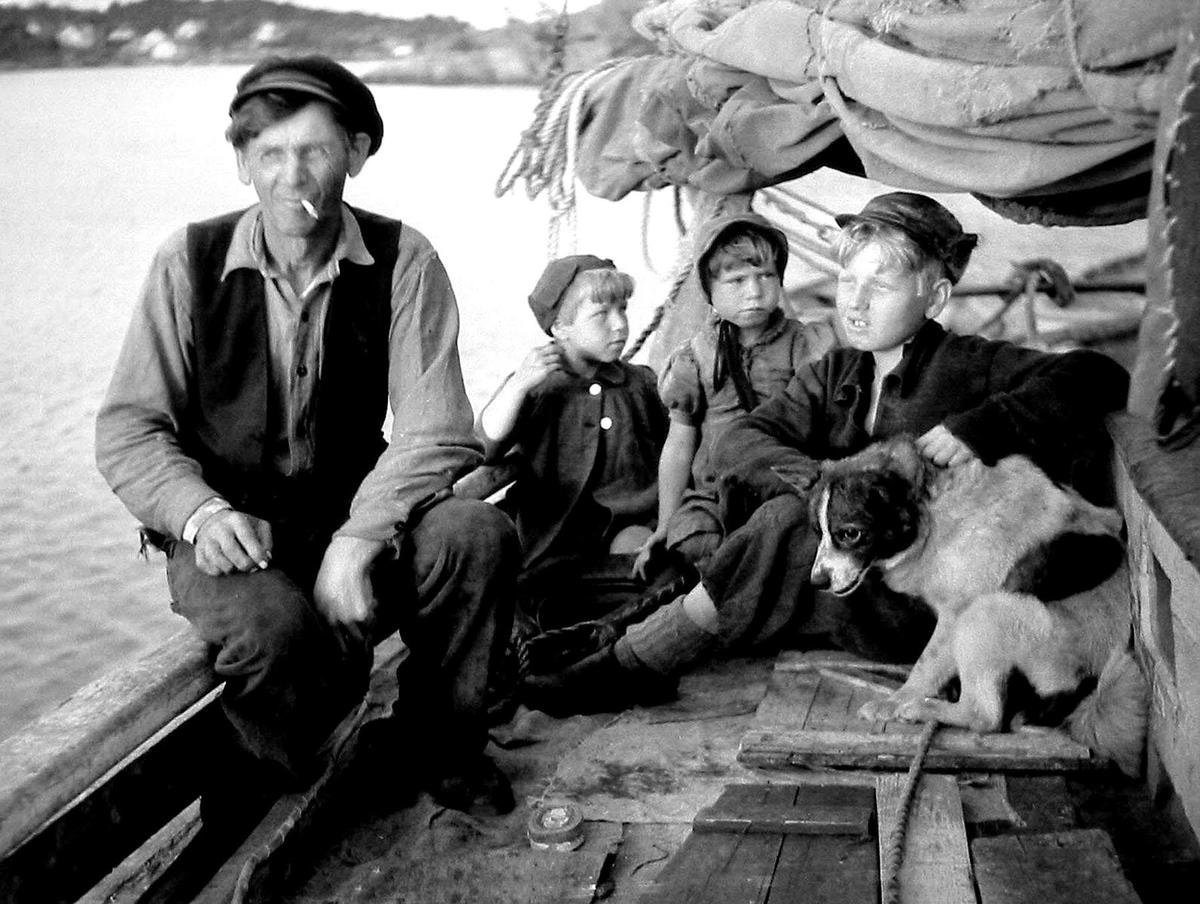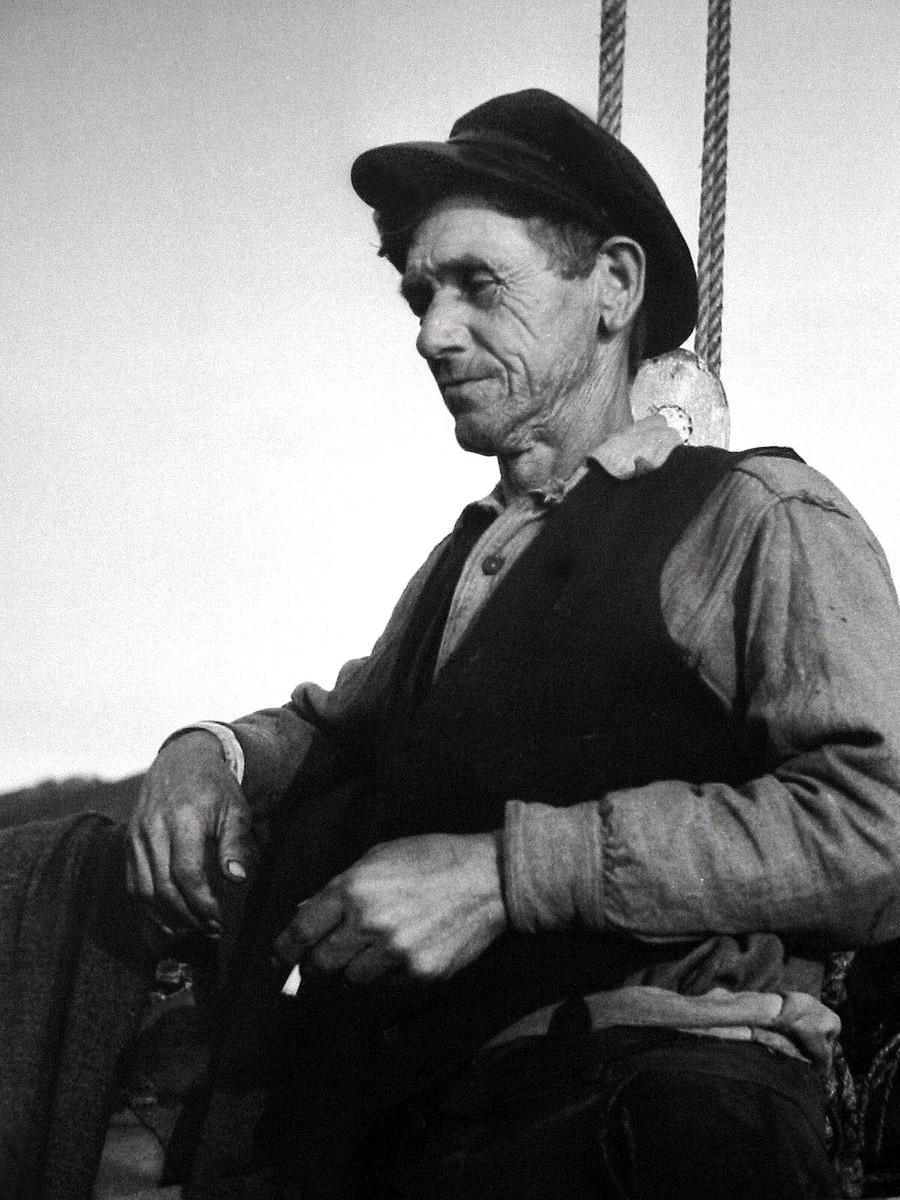Life on board the smack
Johan B (born 1926) explains
"It used to be that some of us travelled by sea and others on land. As a child, I travelled by sea with my parents. I went ashore as an adult. I was born on a smack, and when I was a kid it was common to travel all year, so we travelled the whole winter even though we were sometimes stuck in the ice. Winters were not so good."
"We were 11 siblings. Most of us were born on the boat; only three or four of us were born in a hospital (in Grimstad and in Flekkefjord). Every time my mother was due to give birth, my father fetched the midwife, and we were taken away. It was a struggle. There were way too many children. I once asked my father why there were so many children. ‘That's how it is among people and vagabonds’, he replied."
"In 1938-39, there were many smacks in the Lillesand area. Often, four or five smacks went out together. We divided up the areas and had fixed travel routes. A lot of people lived on the islands then, so there was a lot of trading. We fished, had fish traps and a little net, and if we needed to we set out an extra fish pot. Now the summer tourists have bought the old houses. Trondøya, Bjørnholmen and other islands in the area were permanent places for us."
"We made and sold whisks and knives. My father made the knives. He bought the blades but made the knife handles and the sheaths himself. There were knives with yellow handles, Brusletto knives. Dad also tin-coated copper pots."
"We traded a lot with old beroar (boats), which we fixed up and rebuilt. Dad also spliced ropes. He was good at splicing. My father used to spend a lot of time on Flekkerøya. It was an island of fishermen. He helped the fishermen repair and solder the equipment in the fishermen’s shelters. My father did any work he could do."

"Our boat was called Falken (The Falcon). It had to have a name to be registered. The name had to be etched onto a board and preferably be in the aft hold. During the war, it even had to have a number. We bought Falken in 1935, when I was 9 years old. Before that, we had a smack called Ulabrand, but it became too small as more youngsters arrived. My father found out about this smack, which was in a place near Mandal called Hoven. It had been used as a pilot cutter. He paid NOK 150 for it. He almost worked himself to death to get the money, but he did it. Because my father was good at survival."
"He worked on the boat a lot to rig it the way he wanted it. At the time, it was common that vandriane (Travellers) bought old fishing smacks that they converted into “vagabond smacks”. We bought fishing smacks and rebuilt them with sails and whatever else was necessary. The deck had to be sealed. Dad had a long bolt that he “thickened” the deck with: that is, he clogged up the cracks by hammering rope into them. The cracks were filled with a material – often fabric – that was dipped in tar. Then he poured water onto the deck so that the planks swelled up and became sealed, then he put soft throw rugs on top to retain moisture. It was not easy keeping the boat sealed, especially not in the summer when the planks dried out easily."

"There was no pilot house on the smack. There was a pilot hatch, a forward and an aft cabin, where there was tool storage and where my father stood to steer the boat. The boat had sails, foresail (tip) and jib (similar to the foresail). We mostly used the foresail and the middle sail. Two or three dinghies were in tow. And we had a large forward cabin."
"The boys slept there, for the most part. The girls and boys always slept separately. The smack was cold in the winter even though it was insulated and we had a small oven. It was cramped in the winter when we washed clothes - boiling and drying them in the same space."
"We slept in bunk beds. I remember once when I was going to turn towards my brother at night, my blanket was frozen to the wall! I also remember my sister’s hair being stuck to the wall in the same way. We had to call my father, who took out a knife and cut her loose. Even though the boat was cold, no one was ever sick. I got sick for the first time when I became a permanent resident!"
"We often stayed in Kalstadkilen near Kragerø. Here, we could relax and kjerva morschta (make coffee). In the evenings, the men sat together, and the women sat together. There was much fun and unity. No one was excluded then. Sometimes, when people were drunk, they would cut each other so that the blood splashed around. At the time, there was something called settlement. If you were injured, you could get a smack as compensation if you did not report the assault to the police. That's the way it was in the old days."
"Dad played the accordion. He played at dances, too. The Josdal family in Mandal was particularly good at playing the accordion. It was mostly family travelling together. My family on my mum's side are the Alltings, on my dad’s side the Lindbomms – and then I'm from the Verdal people. We travelled a lot with the Trondsens, Dad’s aunt Guri and his cousins Ingvald and Garman Tronsen. We also travelled a lot with the ‘Rosens’."
(Johan B., born 1926)